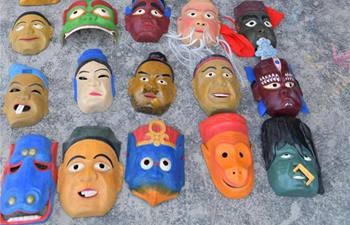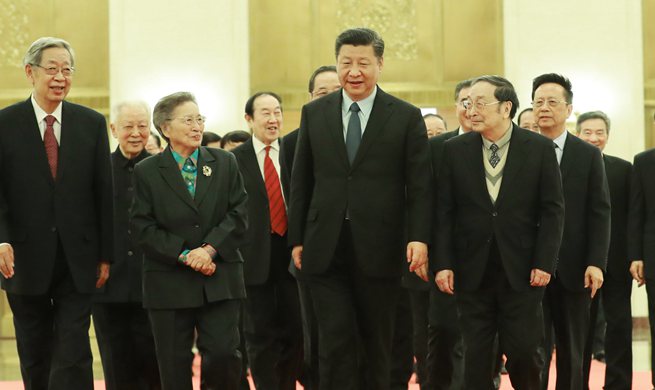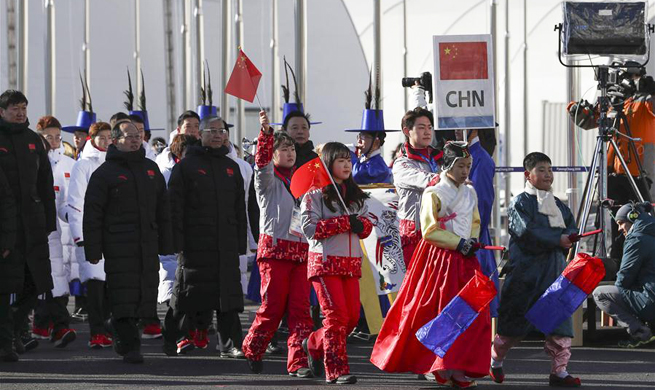by Xinhua writers Cheng Lu, Chu Yi and Zhang Manzi
BEIJING, Feb. 7 (Xinhua) -- The Xinmu Cinema in Beijing's Drum Tower area is always packed on Saturday morning, but the lights are not turned off, and the movie-goers are unable to watch.
When "Monkey King: Hero is Back" starts playing at the cinema, the whispers stop and the audience settles comfortably.
Carrying a white cane and a bag with a red radio inside, 60-year-old Xiao Huanyi arrives an hour before the screening starts.
Guided by a volunteer, he joins another 30 movie-goers in the room which is equipped with an LCD television and a DVD player. He fills up his thermal flask and has a good gossip with friends.
Xiao is tired after a long bus ride in the freezing cold, but hearing the volunteer narrator relaxes him.
"Now the whole icicle breaks apart. Monkey King walks out of the cave for the first time. He jumps from branch to branch and feels extremely happy," a volunteer tells the audience.
Xiao's face brightens up, and leans his left ear to the screen.
"I like watching movies," says Xiao, who was born blind. "Movies can expand my horizons and make a difference to me. I had a bad temper before, but now I am more optimistic about life."
The former worker in a high-heel shoe plant has tasted the bitterness of life. His red radio, the most cherished object in his life, is his only choice of entertainment. Whatever he is doing -- cooking, washing clothes or taking the bus -- he brings it with him.
The first movie he "watched" was a Chinese war film "Guards on the Railway Line," which he saw when he studied at a Beijing's school for the blind in 1972.
But he didn't understand the film until the 2000s when he was invited by a friend to Xinmu Cinema, where he watched the film a second time.
With the help of a volunteer describing the scenes, action or even the emotions on the actors' faces, he got a better understanding.
Xinmu Cinema was set up by Wang Weili and his wife in 2005. It has screened more than 700 films, including "Titanic" and "Speed." Such screenings aid China's over 12 million blind and partially sighted people to enjoy the silver screen.
Losing sight can change a person's life -- even seemingly insignificant things like being able to watch a good film or television.
Online downloads, purchases and private donations are the main sources of the displayed movies, mainly old classics.
Movie selection is a serious thing. The cinema usually selects Mandarin-language movies with positive themes.
"I think the blind are also able to watch movies," says Wang, a former photographer with Chinese Academy of Sciences. "When people lose visual sense, their imagination is greatly improved. They will over-interpret things, with horror scenes becoming more terrifying."
Wang is careful in training volunteers. The volunteers should participate in days of training including how to choose films, write narrations and retell stories.
But the most important part of the training program is darkness experience. Wang asks all the volunteers to cover their eyes with blindfolds to better understand the feelings of the people they serve.
"It's a feeling of fear and helplessness," says Zeng Xin, a cinema employee. "So many of the visually impaired are frequent complainers and pessimists. But the magical power of movies has changed them over the years."
Such magical power can be seen in 53-year-old Chen Guoyue, a street accordion performer and a loyal movie-goer. He donated 10 accordions valued at 20,000 yuan, almost two-thirds of his yearly income, to Xinmu Cinema last year.
"I teach blind students the musical instrument for free. It's my aspiration to give back to the cinema," says Chen, who also enjoys writing poems.
With increased public awareness and strengthened government efforts, the living condition of visually-impaired citizens in China has been greatly improved, such as with better access to education, books in braille, as well as disabled-friendly furniture.
But cinemas for the blind are still rare. Only a dozen of them are found in Beijing, Tianjin, Liaoning and Hubei among other provincial-level regions.
"The biggest challenge cinemas for the blind face is fund shortages," says Zheng Xiaojie, Wang's wife and co-founder of Xinmu Cinema. They need around 2 million yuan each year to run the cinema, including the courtyard rent and salaries for its 13 employees. Most of the money is donated by enterprises and individuals.
Another challenge is a lack of professional service. "The visual narration goes beyond simply explaining what you see on screen. It requires retelling the story to make it more accessible to a blind person," Wang says.
He emphasizes that Xinmu Cinema is different from others, as "the equality provided by Xinmu is not just about the blind's right to watch movies as ordinary people but also includes their needs to know the world."
For loyal movie fans like Xiao and Chen, Xinmu Cinema gives them an equal opportunity to integrate into society.
"It's not all about the movie experience. It's about making new friends or just having a good gossip. Such an experience makes me feel I'm not marginalized by society," Xiao says.
The movie is over at 10:30 a.m. He grabs his bag, says goodbye to his friends, and leaves with another visually impaired movie fan while discussing the Monkey King, no different from any other sighted movie-goers on the street.
"Let's go to eat something. How about noodles this time?" he says.

















